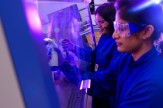Commencement was a day of joy for more than 10,000 graduating Northeastern University students — and their families
“Many of you did not get to celebrate your high school graduation,” President Joseph E. Aoun said. “That’s why we are doubly grateful to be able to celebrate your achievements with you and your families here today.”

This is part of our coverage of Northeastern University’s 2024 commencement.
Northeastern Global News reporters Cesareo Contreras, Noah Lloyd, Erin Kayata, Schuyler Velasco, Alena Kuzub and Cynthia McCormick Hibbert contributed to this story. It is part of our coverage of Northeastern’s 2024 commencement.
Sunday was a day of overwhelming joy for more than 10,000 graduating Northeastern students — and their families.
Count Michael Roberto’s family among them.
A New Jersey native, Roberto participated in the university’s 122nd commencement ceremonies at Fenway Park after earning his master’s degree in computer science.
He was joined by his parents, who were among a crowd of over 55,000 that watched the graduate and undergraduate ceremonies.
“They really put on a good show, and it’s a really supportive school,” Joanne Ruberto said.
But she wasn’t surprised. After all, Northeastern is the best at what it does, she said.
“Everything the school has done has been so well run, including orientation, the first Parents Weekend, graduation,” Ruberto said.
The Northeastern 2024 graduates represented over 127 countries and all 50 states.
For many of them, Sunday was their first in-person commencement, as many of their high school ceremonies were curtailed by the COVID-19 pandemic.
That wasn’t lost on President Joseph E. Aoun.
“Many of you did not get to celebrate your high school graduation,” he said. “That’s why we are doubly grateful to be able to celebrate your achievements with you and your families here in Fenway Park today.”
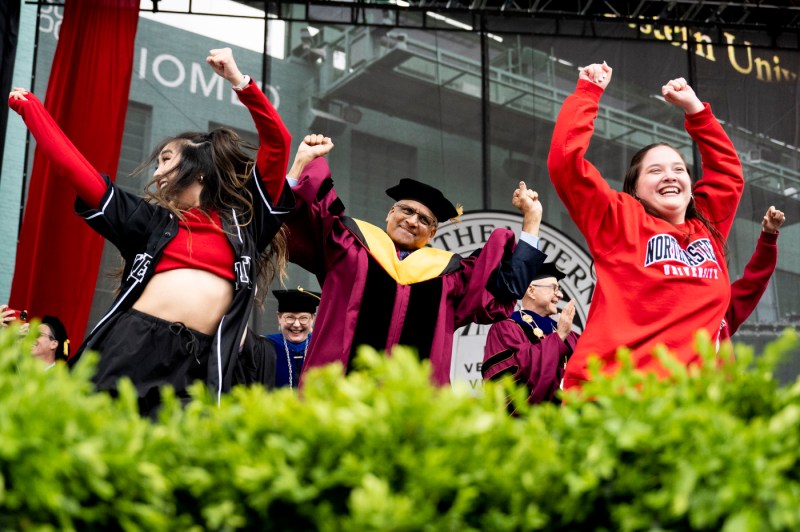
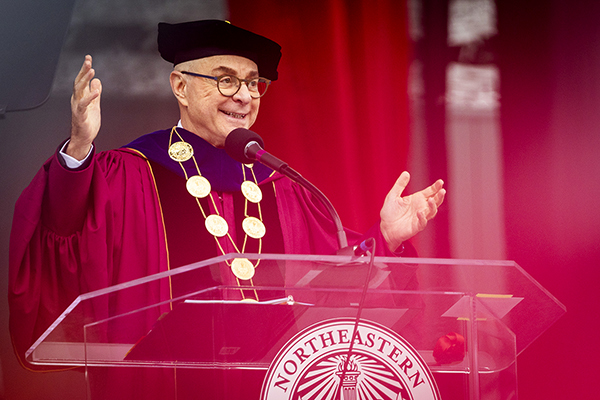
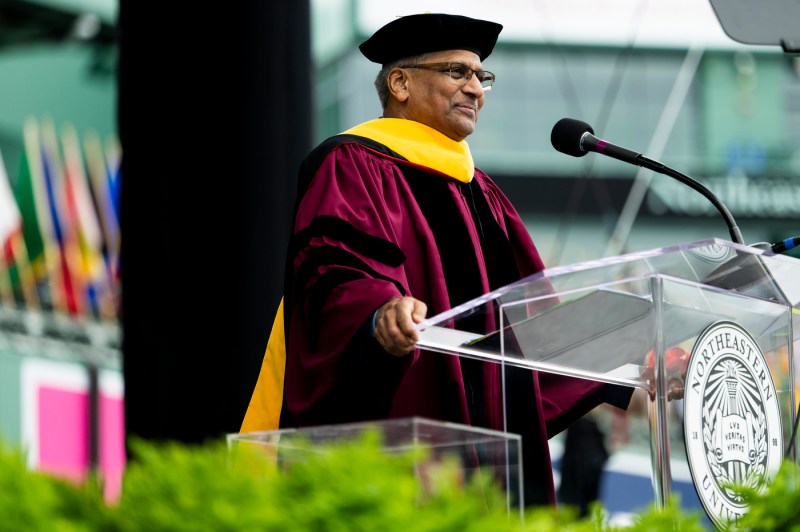
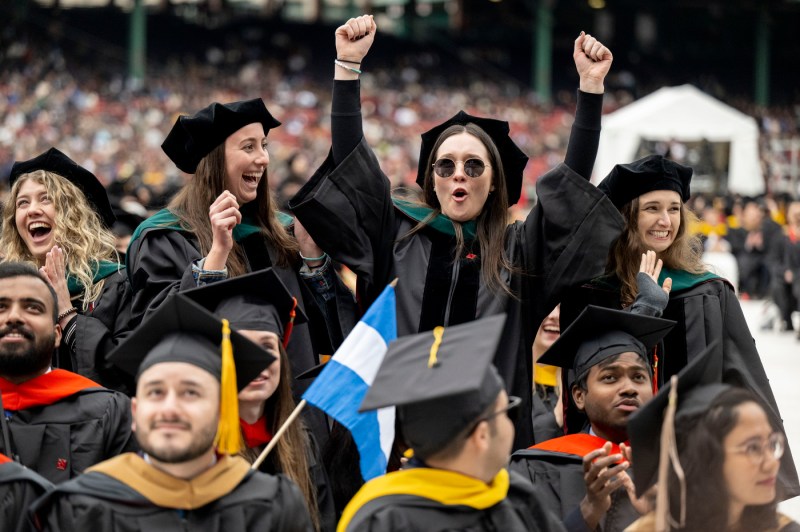
The year these graduates arrived at Northeastern “was tough,” Aoun said.
“Your lives revolved around Cabot, quarantines and QR codes,” he said, referring to the cutting-edge safety measures that Northeastern implemented in order to safely reopen in the fall of 2020, well in advance of most other higher education institutions.
“You took a bet on Northeastern,” he continued. But moreover, “Northeastern took a bet on you.”
Aoun spoke to loud applause at both the morning ceremony for graduate students and the afternoon ceremony for undergraduates.
He was joined on stage in the morning by Sethuraman Panchanathan, director of the National Science Foundation, and Megan Carter, captain of the women’s hockey team. Both delivered memorable speeches of their own.
In the afternoon, undergraduate student speaker Rebecca Bamidele addressed the Class of 2024, followed by David A. Thomas, president of Morehouse College.
Aoun tells grads, ‘We’re in the midst of a profound transformation’
During the undergraduate ceremony, the president highlighted how “We’re in the midst of a profound transformation that will change the way we live, work and interact. The AI world is with us.”
And yet, he went on, “No algorithm can solve the seemingly intractable problems that confound our world.” For that we need “human connection, grounded in respect, patience and empathy,” he said.
All these are qualities developed through Northeastern’s singular experiential learning model and highlighted in Aoun’s award-winning 2017 book “Robot-Proof: Higher Education in the Age of Artificial Intelligence,” which proposed a term for this experience-first mode of education, “humanics.”
“Experience forces us out of our comfort zone. It requires us to deal with uncertainty. It compels us to communicate. It teaches us the art of listening.”
In both speeches, the president also referred to “that famous 21st century philosopher — Taylor Swift.”
Aoun quoted from her song “Nothing New (Taylor’s Version)”: “How can a person know everything at 18 but nothing at 22?”
Positing a willingness to embrace unknowing and to continually move forward, the president said that he loves Swift’s lyrics because “it reminds us that no matter how much we learn, knowledge is infinite. Wisdom begins with realizing how much we do not know.”
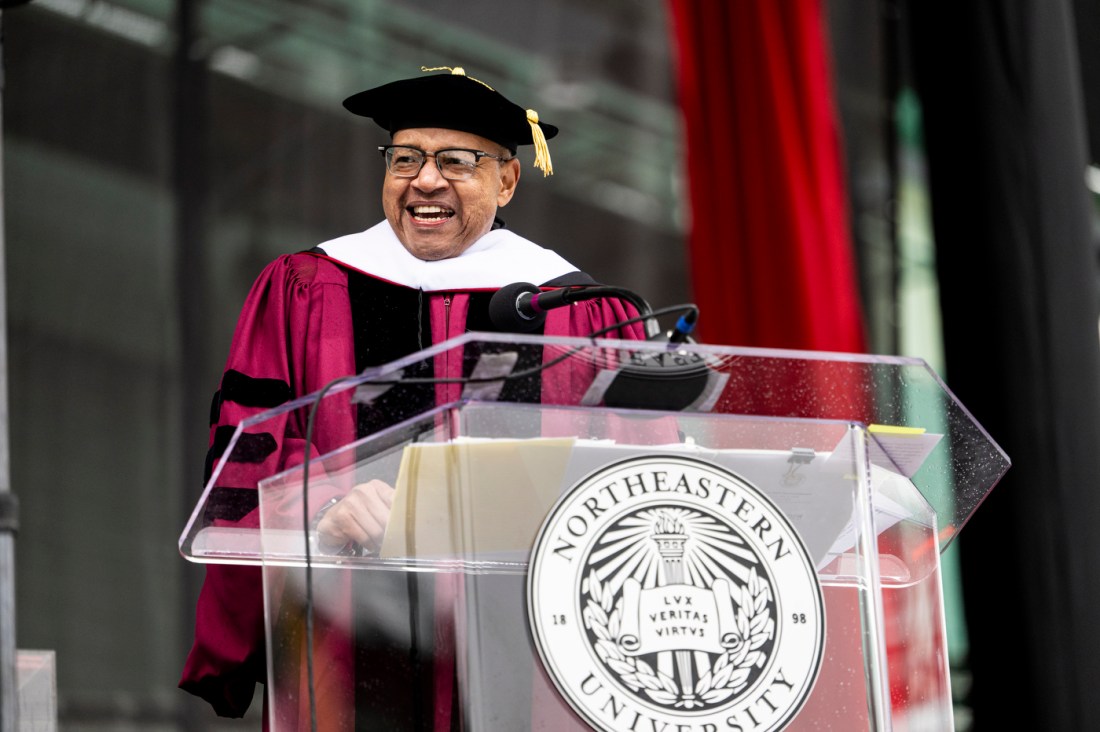
NSF director tells graduates to prepare for a lifetime of learning
Panchanathan challenged graduate students to commit to mentoring at least 25 people after they left Fenway Park and pursue their careers.
“You are all the fortunate ones. Your parents believed in you. Your teachers believed in you. Here you are, successful, ready to take on the world,” said Panchanathan, a computer scientist and engineer who became head of the NSF in June 2020.
For each graduate there are three or four people who didn’t have the same opportunities, he said.
“Each of you should vow that you are going to mentor, inspire, motivate and make opportunities for at least 25 people in your lifetime,” Panchanathan said. “If you’re done, go to 50. Look what a wonderful place you would create in this nation and across the globe.”
Noted for his own mentorship of aspiring scientists and engineers, Panchanathan told graduates he was going to quiz them at the end of his speech to see if they remembered what he called the “10 C’s of success.”
The list started with commencement and ended with congratulations.
Panchanathan also came up with an acronym for Husky: Humanity, Understanding, Service, Knowledge and You.
“What is it about the Husky that makes you so special?” Panchanathan asked, answering by saying Huskies have qualities including persistence and a lifelong learning mindset.
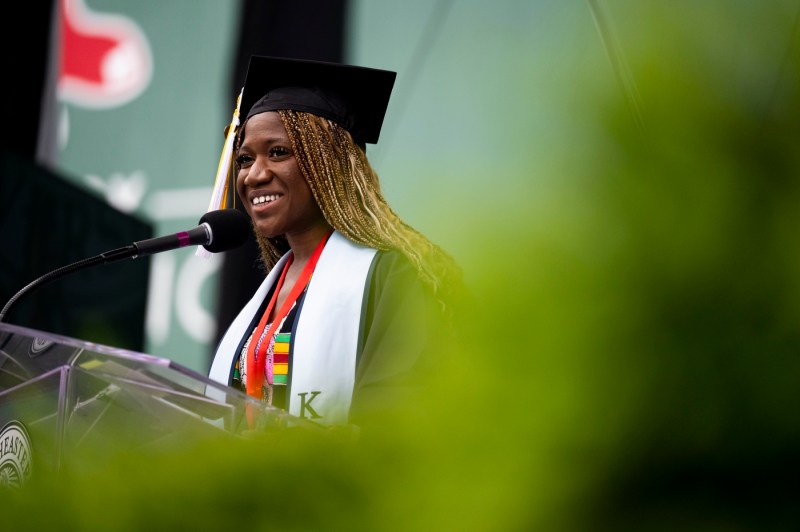
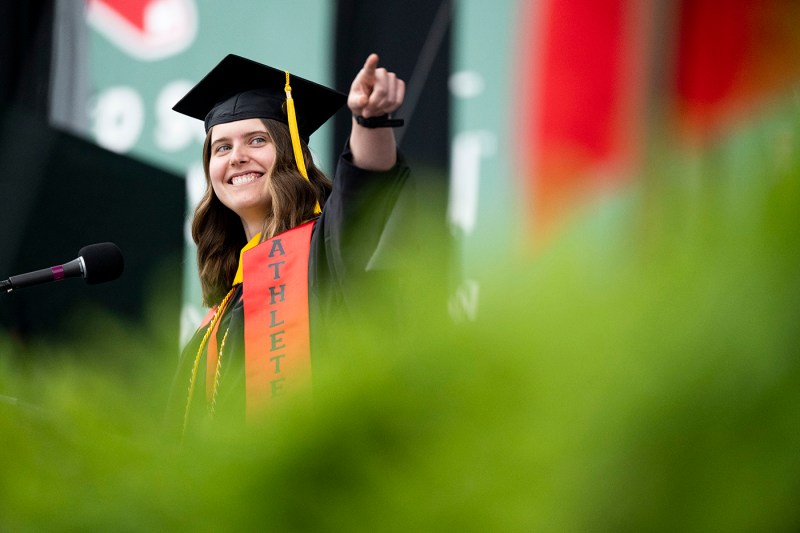
Thomas tells undergraduates they have been ‘a candle in the dark’
Morehouse College and Northeastern may seem like drastically different schools. One is a historically Black men’s liberal arts college in Atlanta. The other is a research university in Boston known for its co-op program.
But they have something in common, Morehouse College President David Thomas said during his address.
“It may not seem obvious at first, but both institutions are unique or distinct at what they do best,” said Thomas, whose daughter, Somer, graduated from Northeastern in 2019.
“Northeastern’s distinctive competencies in experiential education, its focus on bringing together theory and practice. … There’s more demand for what makes Northeastern unique than there has ever been because they provided a light,” Thomas said. “At Morehouse, we have a phrase that we are a candle in the dark. In that way, we are a sister to Northeastern. You have been a candle in the dark.”
Thomas closed his speech by urging graduates to remember to find the humanity in others and “not see them as the other.”
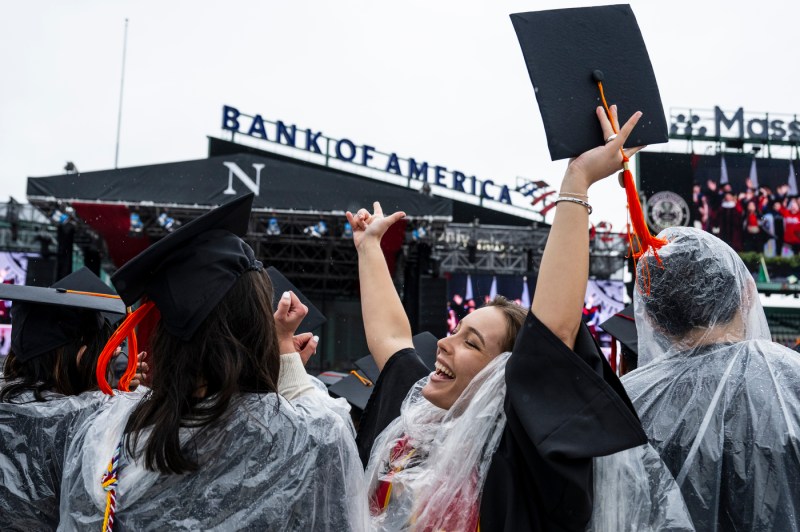
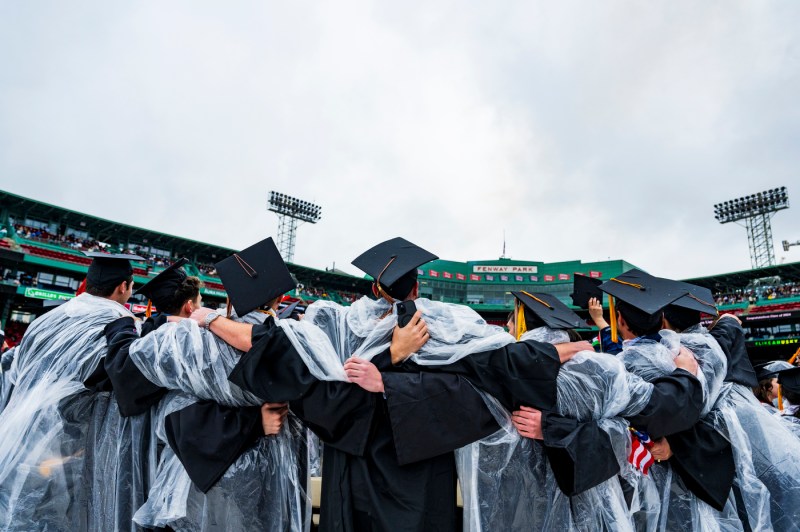
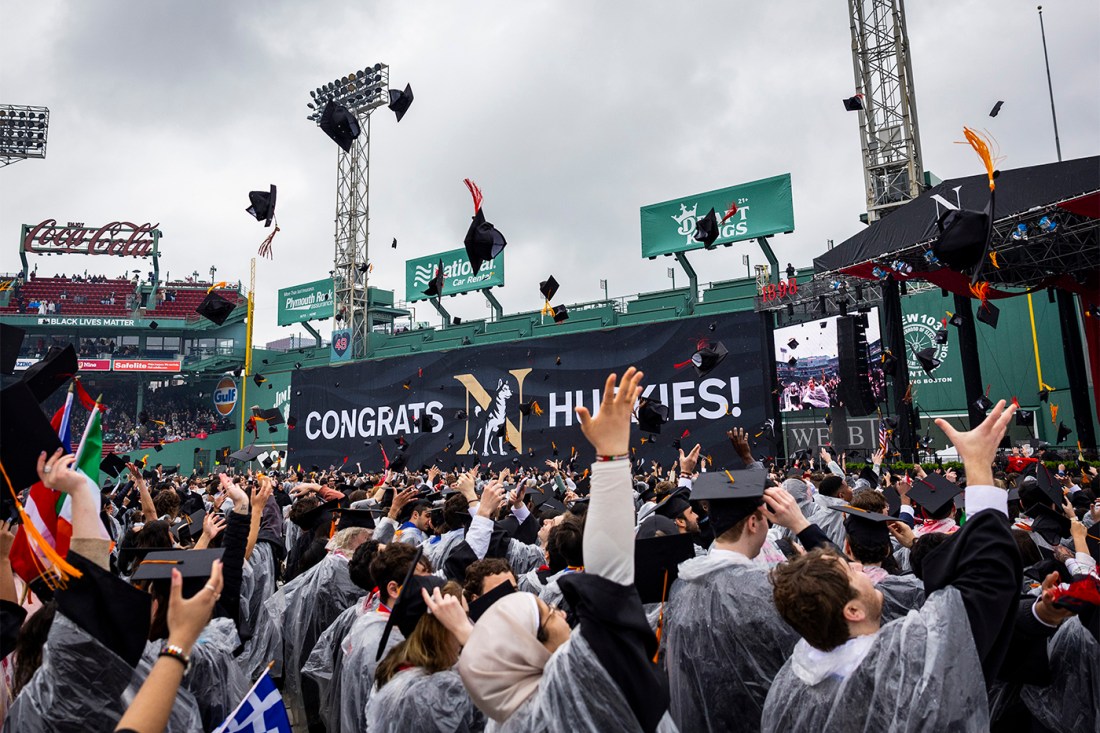
“The highest purpose of education,” he said, “is to create individuals prepared to protect the humanity of those on the planet, to understand that we are all connected in our humanity.
“It starts with empathy,” Thomas continued. “It is accompanied by respect and it must be accompanied by courage not just to see people’s humanity, but the courage to step up for people’s humanity … especially in those moments we’re seeing now. We must all have the courage to step up and protect humanity lest we lose our humanness.”
Carter says challenges are something we ‘get to’ do — not an obligation
Megan Carter told her classmates to build a team to lean on and view challenges as something you “get to do” instead of an obligation.
“Putting in the work is something we get to do, not something we have to do,” said Carter, who graduated with a master’s degree in human movement and rehabilitation science.
Northeastern, Carter said, taught her to seize every opportunity, even when the path wasn’t straight. The two co-ops at Boston hospitals she did as an undergraduate, she said, confirmed she was on the right career path.
“My graduate degree added to that foundation,” she said.
Going to graduate school brought her one step closer to a career as a doctor in sports medicine, Carter said, and opened her eyes to research.
Carter offered some words of wisdom to her classmates, sharing two lessons she had learned as an athlete. First, she advised them to see challenges as an opportunity instead of an obligation.
“Build a ‘get to’ mindset,” she said.
She tried to model a “get to” mindset as a captain for her teammates every day, Carter said, because “putting in the work is something we get to do, not something we have to do.”
Bamidele urges graduates to cherish their ‘Northeastern resumes’
Bamidele said she came to Northeastern unsure of herself, both academically and personally.
A high school student from Concord, New Hampshire, with a wide range of interests — she was senior class president, active in music and theater, and a standout in her chemistry and Latin classes — she arrived on the Boston campus and “struggled,” she admitted to the Fenway crowd.
Featured Posts
Bamidele was so worried about making a mark at the university that she didn’t realize how campus, in and out of the classroom, was making a mark on her.
“Somewhere along the way, Northeastern was shaping me,” she said. “Northeastern helped turn me from a shy, quiet 18-year-old doing her best to blend in to someone who walks around Boston in bedazzled knee-high boots on a Tuesday just for the sake of turning heads.”
To wild applause, she strode from the podium and did a turn, showing off a white, rhinestone-studded dress under her graduation robe and a pair of sparkly, blue-ombre boots with chunky heels that were visible from the back of the ballpark.
Northeastern, she continued, “exposed me to issues that sparked my soul, transforming me from an uncertain engineer fighting through physics into a future doctor passionate about increasing health equity and addressing maternal mortality for women of color. It turned me from an unwilling participant to an enthusiastic contributor, from a fly on the wall to the first in every dance circle, and from Rebecca to Reebs.”







